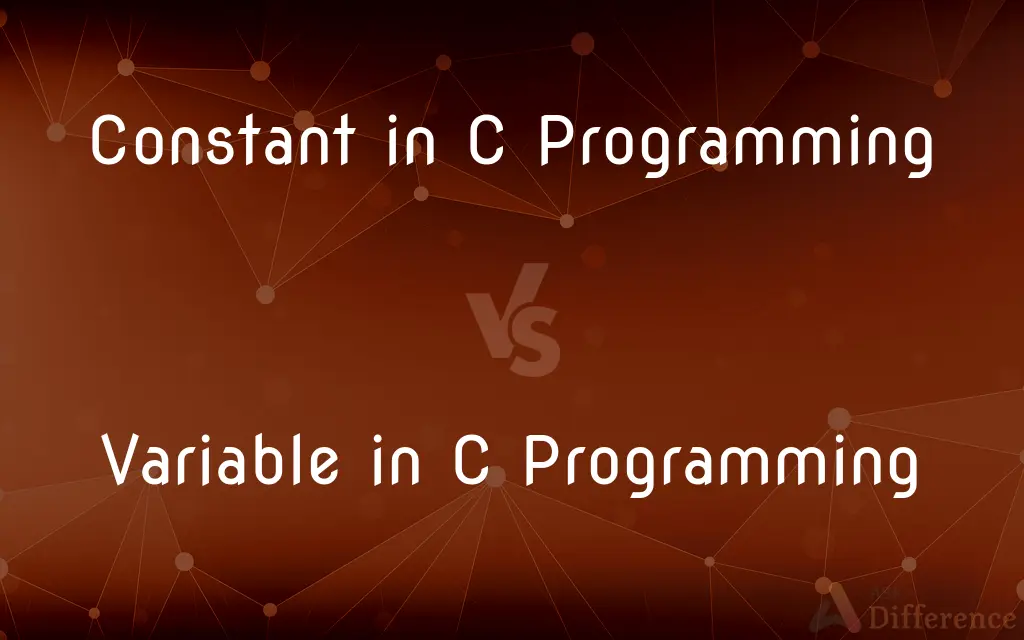Constant in C Programming vs. Variable in C Programming — What's the Difference?
By Tayyaba Rehman — Published on December 13, 2023
In C programming, a Constant holds a value that doesn't change, while a Variable can have its value modified during execution.

Difference Between Constant in C Programming and Variable in C Programming
Table of Contents
ADVERTISEMENT
Key Differences
A Constant in C Programming refers to values that are defined once and remain unaltered throughout the program. In contrast, a Variable in C Programming acts as a storage location that can hold different values at different times during the program's execution.
When using a Constant in C Programming, developers ensure that specific values remain consistent, thereby preventing inadvertent changes. Meanwhile, Variable in C Programming provides flexibility, as they allow values to change, adapting to various conditions or user inputs.
To define a Constant in C Programming, keywords such as const or macros using #define are employed. Conversely, Variable in C Programming is typically declared with a datatype like int, char, float, followed by an identifier name.
In terms of memory, a Constant in C Programming can be placed in read-only sections of memory, ensuring that its value remains untouched. However, a Variable in C Programming resides in the stack or heap, allowing for modifications.
When trying to assign a new value to a Constant in C Programming, the compiler will raise an error. But with a Variable in C Programming, new assignments replace the previous values seamlessly.
ADVERTISEMENT
Comparison Chart
Mutability
Immutable (cannot be changed)
Mutable (can be changed)
Declaration
Uses const or #define
Uses data types like int, float, etc.
Memory Location
Often in read-only sections
In stack or heap
Purpose
Ensure value consistency
Store and update values
Response to Reassignment
Compiler error
Replaces the previous value
Compare with Definitions
Constant in C Programming
Constant in C Programming can be defined using the const keyword or the #define directive.
Using #define PI 3.14159, PI becomes a Constant in C Programming.
Variable in C Programming
Variable in C Programming can be of various scopes like local, global, or static.
A static int count; declaration creates a static Variable in C Programming named count.
Constant in C Programming
Constant in C Programming aids in making the code more readable and maintainable.
Using const int DAYS_IN_WEEK = 7; makes the code clearer than using '7' directly.
Variable in C Programming
Memory for a Variable in C Programming is allocated during runtime, either on the stack or heap.
Declaring double salary; allocates memory for the salary Variable in C Programming.
Constant in C Programming
Constant in C Programming ensures that a value remains consistent and is not modified inadvertently.
Declaring const char GRADE = 'A'; ensures the GRADE remains 'A' always.
Variable in C Programming
A Variable in C Programming is a named storage location that can hold different values.
The declaration int age; creates a Variable in C Programming named age.
Constant in C Programming
A Constant in C Programming is a value that remains unchanged throughout the program's execution.
In the line const int MAX_VALUE = 100;, MAX_VALUE is a Constant in C Programming.
Variable in C Programming
Variable in C Programming can change its value during the program's execution.
If int score = 90; is followed by score = 95;, the score Variable in C Programming changes its value.
Constant in C Programming
Constant in C Programming can be of any datatype like integer, float, or character.
The statement const float RATE = 0.05; sets RATE as a float Constant in C Programming.
Variable in C Programming
Variable in C Programming is declared with a specific datatype which determines the kind of values it can hold.
With char initial;, initial is a Variable in C Programming that can store characters.
Common Curiosities
Why use a Constant in C Programming instead of a Variable?
Constants in C Programming ensure certain values remain unchanged, preventing accidental modifications.
Can a Variable in C Programming be made to behave like a Constant?
Yes, by using the const keyword during its declaration.
Where are Variables in C Programming stored?
Variables in C Programming can be stored in the stack or heap, depending on their declaration and duration.
What is a Constant in C Programming?
A Constant in C Programming is a value that, once set, cannot be changed throughout the program.
Can you modify a Constant in C Programming during runtime?
No, attempting to change a Constant in C Programming will lead to a compile-time error.
How do you declare a Variable in C Programming?
A Variable in C Programming is declared with a datatype followed by its name, like int number;.
Is there a performance advantage to using Constant in C Programming?
Constants can sometimes lead to optimized code as the compiler knows their values won't change.
How does a Variable in C Programming differ from a Constant?
A Variable in C Programming can change its value, while a Constant remains the same.
Can a Variable in C Programming be of any datatype?
Yes, a Variable in C Programming can be of any valid C datatype like int, float, char, etc.
Why might one use a global Variable in C Programming?
Global Variables in C Programming can be accessed from any function, making them useful for values needed across multiple functions.
What happens if you try to assign a new value to a Constant in C Programming?
The compiler will raise an error.
How do you define a Constant in C Programming using macros?
Using the #define directive, like #define LENGTH 50, defines a Constant in C Programming.
Are array sizes in C typically defined using Constant in C Programming?
Yes, using Constants for array sizes makes the code more readable and ensures the size doesn't change inadvertently.
How are pointers related to Variables in C Programming?
Pointers in C Programming store the memory addresses of Variables.
Share Your Discovery

Previous Comparison
Mam vs. Ma’am
Next Comparison
Futures vs. OptionsAuthor Spotlight
Written by
Tayyaba RehmanTayyaba Rehman is a distinguished writer, currently serving as a primary contributor to askdifference.com. As a researcher in semantics and etymology, Tayyaba's passion for the complexity of languages and their distinctions has found a perfect home on the platform. Tayyaba delves into the intricacies of language, distinguishing between commonly confused words and phrases, thereby providing clarity for readers worldwide.












































